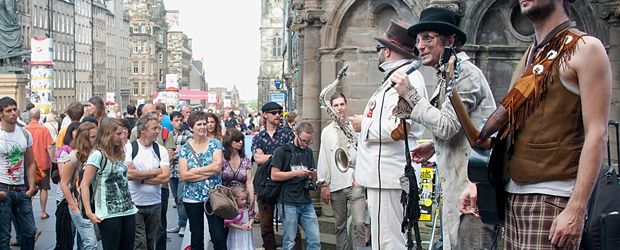Fringe benefits – is Edinburgh’s festival too big?
Edinburgh’s Fringe Festival has introduced the world to a huge range of acting and comic talent in its 64-year history. But is its size now preventing new performers from breaking through?

By the time it ends its 24-day run on 27 August, the 2012 Edinburgh Fringe Festival will have showcased nearly 3,000 events – an average of more than 100 per day.
It means each show has to compete with dozens of others for the attention of punters. The Fringe is now so big that it is a struggle for performers to get noticed.
In the past, new creative talents have been prepared to live with anonymity in the hope that they can build a reputation and get invited back to the next year’s festival.
Over-indulgent and expensive
But comedy reviewer Tim Clark believes the Fringe has now become over-indulgent and too expensive for young talent to come through.
Clark, editor of the Such Small Portions website, believes the Fringe Society, which organises the festival, should do more to pay attention to artists’ needs to allow them to flourish.
“The society is not doing enough to support new talent which is becoming the worst part of the Fringe,” he told Channel 4 News.
“There is not enough organisational backing for the new, young talents.”
Not so, argues Neil Mackinnon, head of external affairs for the Festival Fringe Society. He maintains there is “something for every taste, and room for every kind of performance” at the festival.
And Mackinnon stresses that it remains one of the best places to showcase new talent.
“Producers, talent scouts and promoters believe that this is the place to find the next big thing,” he says.
Free fringe
One response to the apparently sclerotic nature of the “official Fringe” was the formation in 1996 of the free fringe.
Performers get free access to independent venues, on condition that they do not charge punters an entry fee.
The free fringe has included performances from well-known comedians such as Stewart Lee and Simon Munnery, and despite a checkered history in recent years, it continues to attract attention in 2012.
Whatever their views about how Edinburgh’s should best attract and promote talent, Tim Clark and Neil Mackinnon concur about its value as a showcase for performers.
Mackinnon calls it “an open-access festival where any ideas are welcomed and where changes are created by the talent that comes”.
Clark agrees: “Despite the growth of the festival, it is still a wonderful place to be. Careers can still be launched from a good show at the Fringe.”